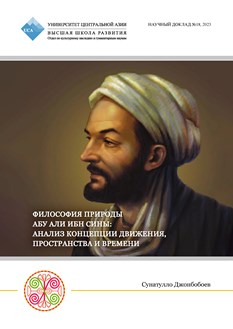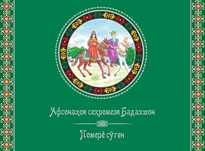Philosophy of Nature of Abu Ali ibn Sina: Analysis of the Concept of Movement, Space and Time
A scientific perception of the world in the present independent Tajikistan, and Central Asia in general, is more in demand than ever. Our intellectual heritage, including the views of Al-Khwarizmi, Ar-Razi, Al-Biruni, Abu Ali ibn Sina, and others, are a source of new inspiration and resource for addressing the many societal issues of post-Soviet communities, including the existing secular political system and scientific worldview, the emergence of fundamentalist and radical religious interpretations, depreciation of traditional values, existing poorly developed analytical thinking among youth and others.
The intellectual heritage of our ancestors from Central Asia and Iran has been used during the Reformation and the New Age by the societies and scholars of Western Europe, including Dante Alighieri, Albertus Magnus, W. Ockham, Thomas Aquinas, F. Bacon (inductive logic), G. Galileo (movement and rotation of Earth), and R. Descartes (the concept of “flying man”). This intellectual heritage also has been reinterpreted by thinkers of the twentieth century, even if indirectly, such as Einstein. The fruitful influence of Muslim culture on the development of modern civilization has long been known and studied in such works as G. Sarton’s “Introduction to the History of Science”, Henri Corbin’s “History of Islamic Philosophy”, W. M. Watt and many others. However, surprisingly our young compatriots today are indifferent toward this intellectual heritage. How can we fill the intellectual and spiritual gap in the minds of today’s youths, who are holding shaking worldviews, some of whom are moving towards radicalism? How important is the actualization of the history of sciences and rationalism?
To address these concerns and others, we should refresh our mind and focus our analysis on selected works of Abu Ali ibn Sina concerning the philosophy of nature, namely the issues of motion, time, and space. Ibn Sina’s theories generally are comparable to Aristotle’s however, they are original in terms of putting forward new aspects of these theories, including the theory of plurality of words, the theory of movement, space and time, the concept of impetus (inertia), the relativity of time and space, the concept of eternity time and God, in the forms of the concepts of Dahr, Qadim, and Sarmad, the details of which will be shown and be discussed in this paper.
Modern generations of Central Asia can use such intellectual heritage and cultural capital (as an example) for the purpose of modern regional educational and scientific development.








